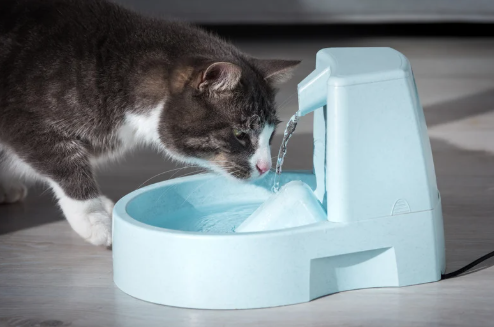By: Samantha Morin, Laboratory Assistant

Cats are fascinating creatures — equal parts ancient desert survivor and modern-day snuggle companion. Their bodies still carry traits from their wild ancestors, especially when it comes to how their kidneys work.
Nearly 10,000 years ago, a few African Wild Cats in the deserts of the Middle East decided that befriending humans was the key to living the good life. Today, their descendants continue that legacy as our sweet little housecats.
Though our kitties may have left the desert, the desert hasn’t left them — modern cats have inherited their ancestors’ remarkably efficient kidneys. While this may sound like a good thing, it has its drawbacks. A cat can lose up to 75% of kidney function before signs of disease appear on routine bloodwork — and may not show any symptoms at all.
Another challenge is that most cats drink only the bare minimum of water they need to survive. That doesn’t give their kidneys much wiggle room when it comes to filtering toxins from the blood. Since you probably can’t convince your cat to carry around a tiny Hydroflask, what can you do to help them stay hydrated and support kidney health?
Running Water
Cats are naturally more attracted to running water than still water. A pet drinking fountain can encourage them to drink more and stay hydrated. These come in a variety of affordable and stylish options, many with charcoal filters to keep the water tasting fresh and clean.
Canned Food
Messy and stinky though it may be, most cats love wet food — and canned food is about 70–80% water, compared to less than 10% in most dry kibble. Adding more wet food to your cat’s diet is one of the easiest ways to increase hydration.
Litter Box Maintenance
HAve you ever avoided a restroom because it was just too unpleasant? Your cat feels the same way about a dirty, noisy, or poorly located litter box.
Keep litter boxes in quiet, private areas away from heavy foot traffic and loud appliances. Scoop waste daily and wash the box weekly. If you have multiple cats, follow the golden rule: one box per cat, plus one extra.
Common Signs of Kidney Disease
- Increased thirst or urination
- Decreased appetite
- Weight loss
- Lethargy
- Unkempt coat
Keeping Your Cat Healthy for Years to Come
Even if your cat is diagnosed, kidney disease is manageable when caught early — and early detection is now easier than ever thanks to new testing advancements.
At Bishop Ranch Veterinary Center, we offer several affordable panels that screen for signs of kidney disease (and other conditions) using both blood and urine samples. Because the risk increases with age, we recommend an exam and testing once a year for younger cats, and every six months for senior cats.
Your cat depends on you to protect their health — schedule their next wellness visit today to help keep their kidneys (and the rest of them!) happy and thriving.
Call or text us at (925) 866-8387 to book your cat’s appointment, or log into your Pet Portal to schedule online!







